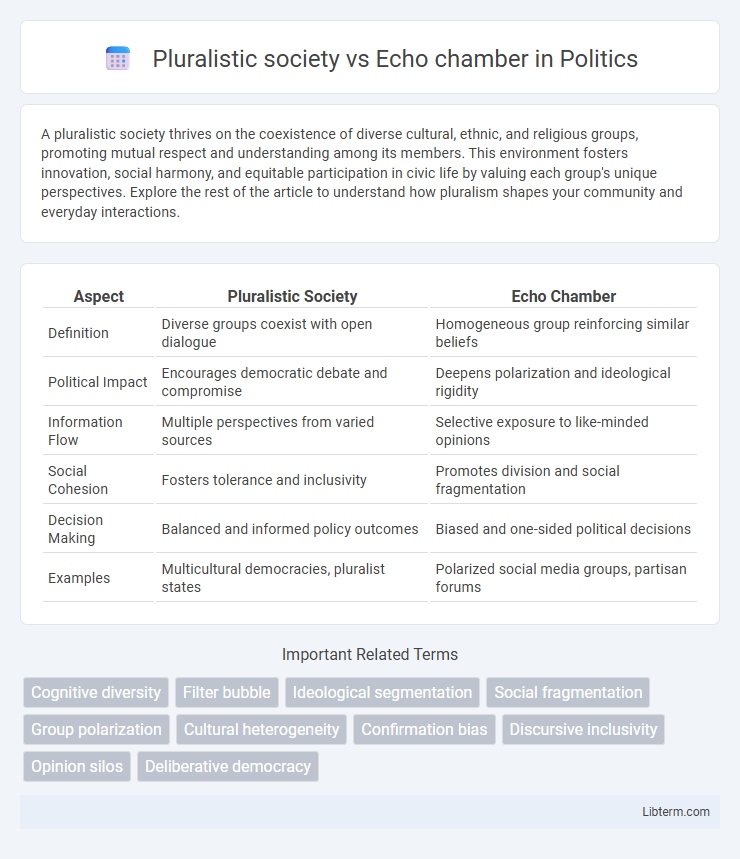A pluralistic society thrives on the coexistence of diverse cultural, ethnic, and religious groups, promoting mutual respect and understanding among its members. This environment fosters innovation, social harmony, and equitable participation in civic life by valuing each group's unique perspectives. Explore the rest of the article to understand how pluralism shapes your community and everyday interactions.
Table of Comparison
| Aspect | Pluralistic Society | Echo Chamber |
|---|---|---|
| Definition | Diverse groups coexist with open dialogue | Homogeneous group reinforcing similar beliefs |
| Political Impact | Encourages democratic debate and compromise | Deepens polarization and ideological rigidity |
| Information Flow | Multiple perspectives from varied sources | Selective exposure to like-minded opinions |
| Social Cohesion | Fosters tolerance and inclusivity | Promotes division and social fragmentation |
| Decision Making | Balanced and informed policy outcomes | Biased and one-sided political decisions |
| Examples | Multicultural democracies, pluralist states | Polarized social media groups, partisan forums |
Understanding Pluralistic Societies
Pluralistic societies thrive on diversity of thought, where multiple viewpoints coexist and contribute to a dynamic social fabric. Understanding pluralistic societies involves recognizing the value of inclusive dialogue and the coexistence of conflicting beliefs without suppressing dissent. This openness counters the formation of echo chambers, which isolate individuals within homogeneous ideological groups, limiting exposure to differing perspectives and undermining social cohesion.
Defining Echo Chambers
Echo chambers are environments where individuals encounter information that reinforces their existing beliefs, limiting exposure to diverse perspectives. Unlike pluralistic societies, which embrace cultural and ideological diversity fostering open dialogue, echo chambers create insular spaces that amplify bias and polarization. This phenomenon is prevalent in social media algorithms that curate content aligned with users' preferences, reducing opportunities for critical engagement with differing viewpoints.
Core Characteristics: Pluralism vs Echo Chambers
Pluralistic societies thrive on diversity of opinions, encouraging open dialogue, tolerance, and the coexistence of multiple perspectives within a shared public sphere. Echo chambers, in contrast, are characterized by homogeneity of thought, where individuals are exposed primarily to information and beliefs that reinforce their existing views, limiting exposure to dissenting perspectives. Key characteristics of pluralism include inclusivity and critical debate, while echo chambers promote confirmation bias and social polarization.
Diversity of Thought and Dialogue
A pluralistic society thrives on diversity of thought, encouraging open dialogue among individuals with varying perspectives, fostering innovation and social cohesion. In contrast, an echo chamber restricts dialogue to homogeneous views, limiting exposure to diverse ideas and reinforcing existing beliefs, which can hinder critical thinking and societal progress. Emphasizing inclusive conversations in diverse communities enhances mutual understanding and combats polarization.
Information Flow and Filtering
Pluralistic societies foster diverse information flows by encouraging multiple viewpoints and open access to varied media sources, enhancing critical thinking and resilience against misinformation. In contrast, echo chambers limit information flow through selective exposure and algorithmic filtering, reinforcing existing beliefs and reducing cross-ideological dialogue. Effective information filtering in pluralistic societies relies on transparency and diverse networks, whereas echo chambers rely on homophily and confirmation bias.
Social Media’s Role in Both Realms
Social media platforms amplify the dynamics of both pluralistic societies and echo chambers by enabling diverse voices to coexist while algorithmically promoting content that aligns with users' existing beliefs. This selective exposure fosters fragmented communities, where pluralistic dialogue is often overshadowed by the reinforcement of homogeneous viewpoints. Understanding the role of platforms like Facebook, Twitter, and Instagram in shaping public discourse is crucial for addressing polarization and enhancing democratic engagement.
Effects on Democracy and Decision-Making
A pluralistic society fosters diverse viewpoints that enhance democratic deliberation and improve decision-making by incorporating a wide range of perspectives and promoting tolerance. In contrast, echo chambers limit exposure to differing opinions, reinforcing biases and undermining democratic processes by fostering polarization and reducing critical debate. This narrowing of information flow weakens collective decision-making and threatens the legitimacy of democratic outcomes.
Psychological Impacts on Individuals
Pluralistic societies promote diverse perspectives, fostering cognitive flexibility and resilience by exposing individuals to a broad spectrum of ideas, which enhances critical thinking and reduces confirmation bias. In contrast, echo chambers limit exposure to differing viewpoints, reinforcing existing beliefs and increasing psychological polarization, leading to heightened anxiety, intolerance, and decreased openness to change. This restricted information environment often exacerbates groupthink, diminishing individual autonomy and emotional well-being.
Breaking Out of Echo Chambers
Breaking out of echo chambers requires actively engaging with diverse perspectives within a pluralistic society to challenge confirmation bias and broaden horizons. Exposure to varied viewpoints fosters critical thinking and reduces polarization by promoting empathy and understanding across social groups. Utilizing media literacy skills and seeking multidisciplinary sources enhances the ability to navigate complex information environments effectively.
Fostering a Truly Pluralistic Society
Fostering a truly pluralistic society requires encouraging diverse perspectives and open dialogue that transcends the limitations of echo chambers, where individuals are often exposed only to information reinforcing their existing beliefs. Promoting inclusive communication platforms and educational initiatives helps bridge ideological divides and cultivates mutual understanding among different cultural, social, and political groups. Effective pluralism thrives on the exchange of varied viewpoints, critical thinking, and respectful discourse, which counteracts polarization and supports social cohesion.
Pluralistic society Infographic

 libterm.com
libterm.com